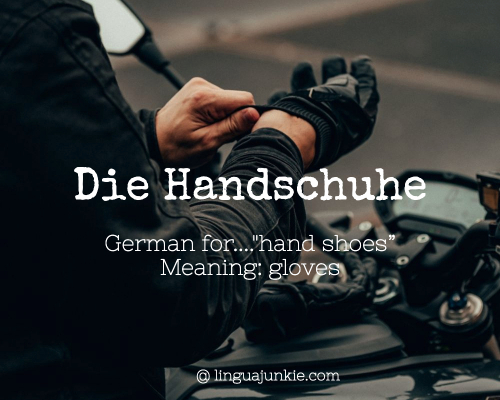Are there really beautiful German words out there…? Given the pronunciation and all?
Well, you’d be surprised.
Today, I, the main Lingua Junkie, will put some untranslatable and/or beautiful German words and phrases into your brain. Phrases like… “I only understand train station,” “living room tiger” and “honey cake horse.” So, let’s go.
1. Der Stubentiger
- Meaning: a cat
- Pronunciation: “der shtoo-ben-tee-gar”
This is an adorable way to refer to a cat. It literally means “living room tiger.” “Stube” means “living room” and “Tiger” means (of course) “tiger.” Although the German word “Katze” also exists, which means “cat,” this is a cute way to refer to that adorable feline. If you are a cat lover, you know that this term captures a cat’s true essence.
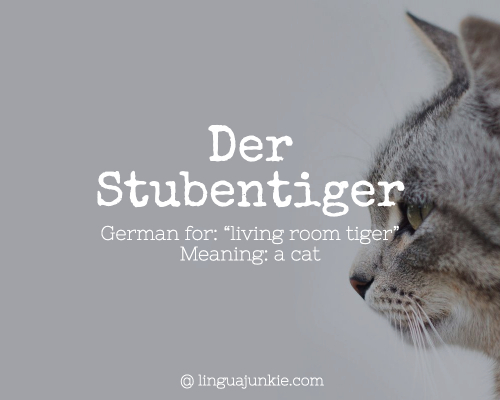
2. Der Drahtesel
- Meaning: the bicycle
- Pronunciation: “deh-ah draht-eh-sel”
This is a beautiful name for a bicycle. “Draht” means “wire” and “Esel” means “donkey.” Therefore, “Drahtesel” literally means “wire donkey.” In many German cities, such as Berlin, your bike becomes your best friend. You rely on it to take you anywhere. This is therefore a nice way to refer to it.
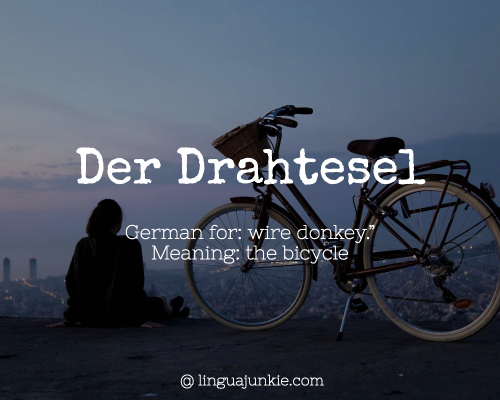
3. der Wortschatz
- Meaning: the vocabulary
- Pronunciation: “deh-ah vohrt-shahts”
This is a term which is used in everyday life to refer to “vocabulary.” However, if you analyze the term, it is actually a beautiful word! It is composed of two words: “Wort,” which means “word” and “Schatz,” which means “treasure.” Therefore, this term literally means word treasure, or treasure of words, which is exactly what the word vocabulary is!
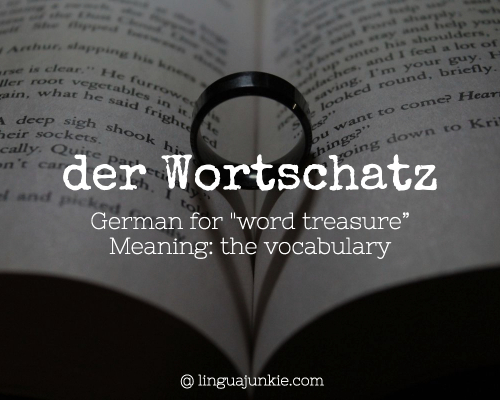
4. Die Glühbirne
- Meaning: the lightbulb
- Pronunciation: “dee glueh-beer-naeh”
The term literally translates to “glowing pear.” However it is used to refer to a lightbulb. It is cute to imagine ordinary lightbulbs as magical glowing pears.

5. Das Nasenfahrrad
- Meaning: the glasses
- Pronunciation: “dahs nah-sehn-fah-rahd”
This literally means “nose bicycle.” However, isn’t it an original way to refer to your glasses? You will surely remember the term.
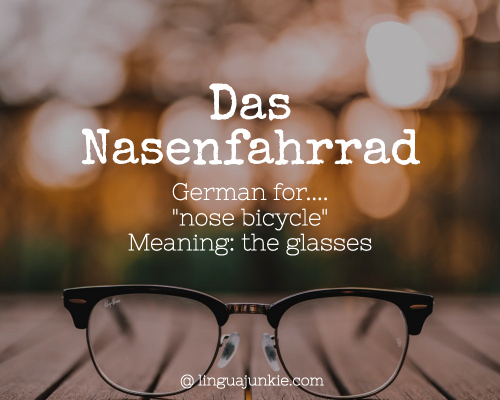
6. Ich verstehe nur Bahnhof
- Meaning: to not understand what is being said
- Pronunciation: “eeh (h as in huge) fehr-shteh-aeh noo-ah bahn-hof”
This is a very popular and funny expression. Literally it translates to “I only understand train station.” It is used when you have no idea what the other person is talking about. When you are either not able or not willing to understand what is being said.
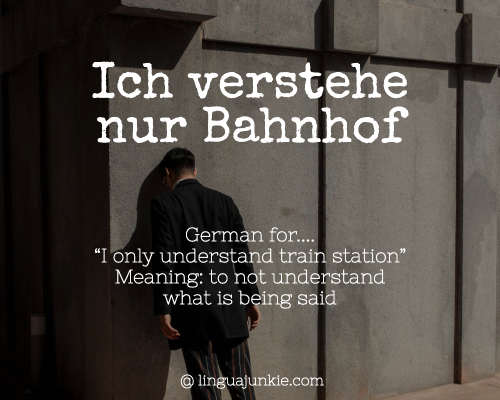
7. Das Honigkuchenpferd
- Meaning: someone who is really happy
- Pronunciation: “dahs hoh-nih(ç)-koo-hen-fehrd”
Although it literally translates to “honey cake horse,” it refers to people who are really happy and in a great mood. You may see them smiling happily because they’re having a great day or because they’re in love, for example. The three words included in this term (honey, cake, and horse) are all “cheerful” words and it’s easy to understand why they represent happiness.
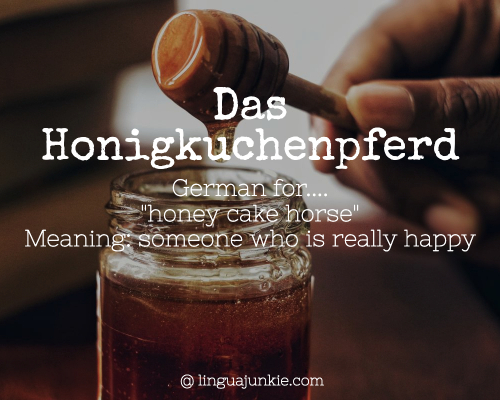
8. die Sehenswürdigkeiten
- Meaning: tourist attractions
- Pronunciation: “dee seh-ehn-wuehr-dich(ç)-kai-ten”
It translates to “things worthy of seeing” and refers to tourist attractions. Whenever you visit a new city, you are probably sure to visit the main attractions. Doesn’t this term literally describe what tourist attractions are?

9. Die Wollmaus
- Meaning: ball of dust
- Pronunciation: “dee vohl-maus”
This is a lovely way to refer to a ball of dust. It literally translates to “wool mouse.” You may encounter these when you move a piece of furniture that hasn’t been moved in a long time.
 10. Die Nacktschnecke
10. Die Nacktschnecke
- Meaning: slug
- Pronunciation: “dee nakt-shneh-kaeh”
The literal translation is “naked snail.” Isn’t this exactly what a slug is? A snail without a shell is effectively a slug.
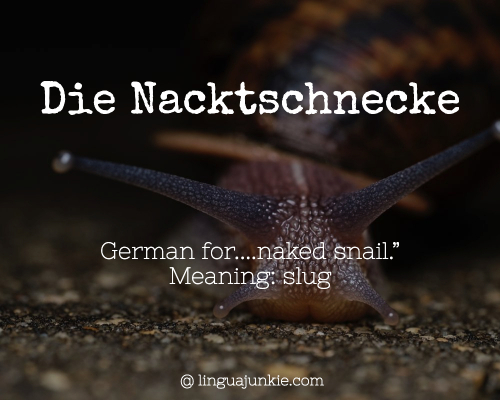
11. das Luftschloss
- Meaning: daydreams, fantasies, unrealistic dreams
- Pronunciation: “dahs looft-shlohs”
This beautiful term is composed of the term “Luft,” which means “air,” and “Schloss,” which means “castle.” It literally translates to “air-castle.” However, it is used to refer to a fantasy or even an unrealistic dream. When you daydream and think about where you want to go in your life or fantasize about a better, more utopic world, you are basically building your “air-castle.”
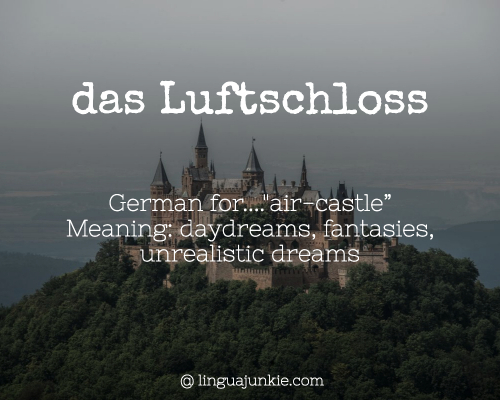
12. Zeitgeist
- Meaning: the “spirit” and general characteristics of a particular period of time
- Pronunciation: “dee tsait-gah-eest”
“Zeit” means “time” and “Geist” means “spirit.” So it literally translates to “time spirit.” It refers to the beliefs, ideas, cultural climate, etc. that characterize an era or time period. It is truly the “spirit” of a particular period in history. This includes everything related to politics, social rights movements, the arts, etc.
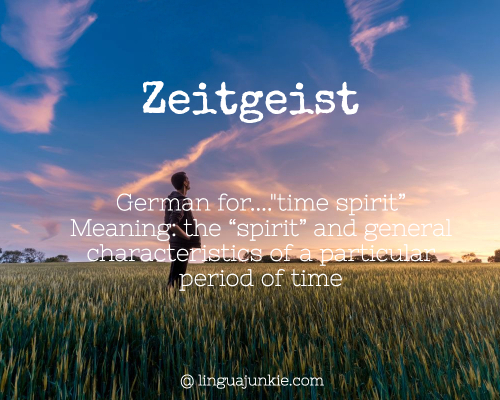
13. Das Zahnfleisch
- Meaning: chewing gum
- Pronunciation: “dahs tsahn-fly-sh
The literal translation is “teeth meat.” Doesn’t this paint a proper picture of what gum really is?
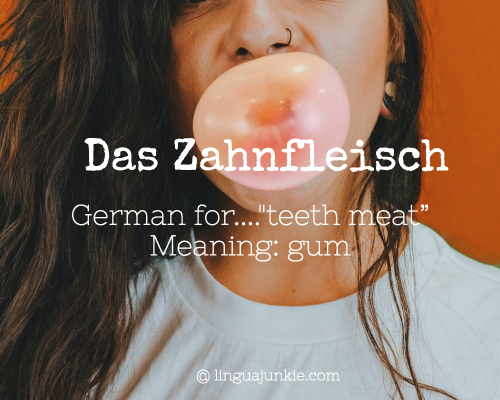
14. Die Gänsefüßchen
- Meaning: quotation marks
- Pronunciation: “dee gehn-saeh-fuehs-hyen”
This is an adorable way of calling quotation marks. The literal translation is “little goose feet.” Don’t quotation marks look just like that? There is, however, a “normal” term for quotation marks in German, which is “Anführungszeichen.” If you’re looking for a more original way to refer to them, then you can call them “Gänsefüßchen.”

15. Die Zeitlupe
- Meaning: slow motion
- Pronunciation: “dee tsait-loo-paeh”
This word describes exactly what slow motion is. It literally translates to “time magnifying glass.” You definitely want to focus on all the details whenever you watch something in slow motion. It’s as if you were using a magnifying glass on time. That way you can zoom in to catch all those little details you’re looking for.
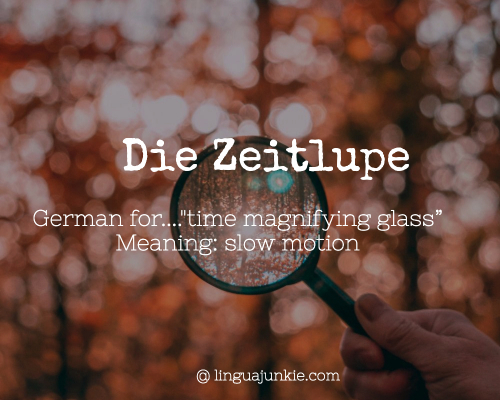
16. Fernweh
- Meaning: the opposite of homesickness, “farsickness”
- Pronunciation: “feh-ahn-veh”
There is a German term for “homesickness,” which is “Heimweh.” However, there is also a term to describe the opposite of homesickness. The term is “Fernweh,” which means “farsickness.” “Fern” means “far,” and “weh” means “ache.” The term literally translates to “distance ache.” This is the ache that you feel when you want to be somewhere else, maybe a country where you have traveled to before, or just anywhere really far away.
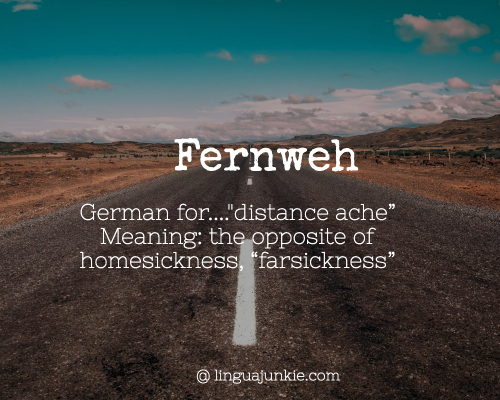
17. Die Handschuhe
- Meaning: gloves
- Pronunciation: “dee hand-shoo-aehn”
Gloves are to your hands as shoes are to your feet. Germans sure take this into consideration when they call their gloves “Handschuhen,” or “hand shoes.”
18. Der Lebensabend
- Meaning: the last years of a person’s life
- Pronunciation: “deh-ah leh-behns-ah-bend”
It literally means “life evening.” It’s a beautiful way to refer to the last years of a person’s life. It refers to the “evening” of one’s life.
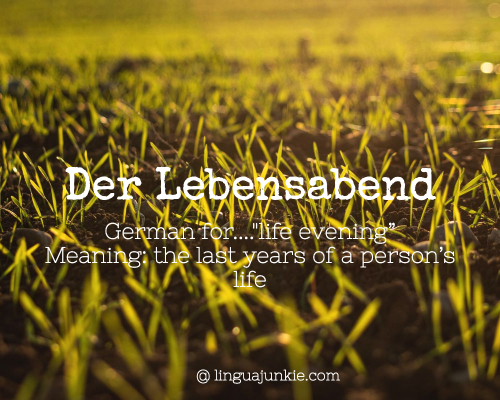
Conclusion — Back to You
Now you know some beautiful German words and expressions.
Which one was your favorite? Leave a comment.
Also, if you want to learn and speak even more German, here’s a 3-minute German audio lesson that’ll teach you how to say “German Greetings.”
- 3-Minute Lesson #2 – Greetings
- Free Lesson by GermanPod101.com – click here for more free audio lessons.
– The Main Lingua Junkie
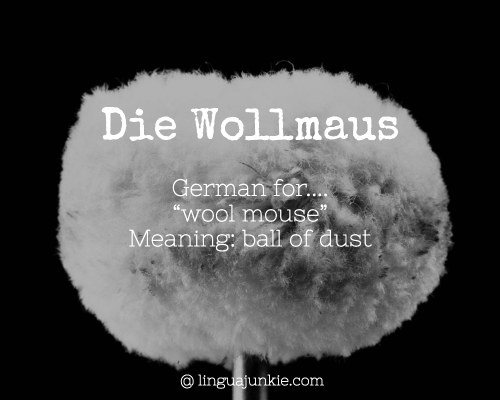 10. Die Nacktschnecke
10. Die Nacktschnecke